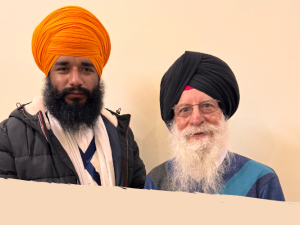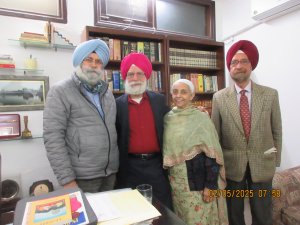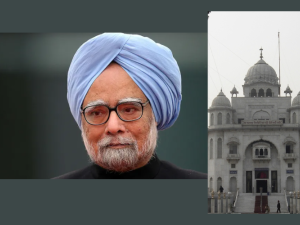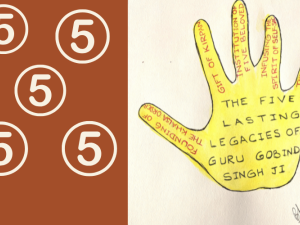Singing Praises of God is the unique methodology that Guru Nanak Dev Ji shared with the world, not just as a way of personal transformation, but enabler of merger with God, plus experience of Oneness. He had not only experimented with it himself to stay attuned in divine presence, but passionately shared it to impact the lives of those he met during his lifetime. The adoption of this process was the outcome of a realization on what was easily understood and could inspire them to adopt those. It was singing raises of God.
Before embarking on his journeys Guru Ji was employed as Modi in Sultanpur, when Bhai Mansukh from Lahore visited Guru Ji, after listening to the singing of Guru Ji hymns which pierced his heart, he became Guru Ji’s follower. Guru Ji had realized the power of music to uplift and transform the soul, so he asked Bhai Mardana to be his companion on his long odysseys, so that jointly they could convey Guru Ji’s message. During interactions, Guru Ji used to sing praises of God and Mardana used to play rabab, a string instrument. Guru Ji understood that we humans are wired for music. Music has an immediate effect on us by lifting our moods, impacting us physically, emotionally, and spiritually. Guru Ji employed music for spiritual upliftment by singing praises of the Creator to bring His virtues to our attention. Previously music had primarily been used for entertainment. Guru Ji has shared with us the words of supplication on how to ask for blessings to sing as:
ਤੇਰੇ ਗੁਣ ਗਾਵਾ ਦੇਹਿ ਬੁਝਾਈ ॥
“Taerae gunn gaavaa dheh bujhaiee.” (SGGS, Pg. No. 795)
Translation: Please bless me with such understanding, that I may sing Your Glorious Praises.
We can see the humility in Guru Ji from these words above. Guru Ji conviction about the efficacy of this method can be gauged from these words:
ਸਿਫਤੀ ਗੰਢੁ ਪਵੈ ਦਰਬਾਰਿ ॥੨॥
“Sifatee ga(n)dd pavai dharabaar. 2.” (SGGS, Pg. No. 143)
Translation: Through the Lord's Praise, we establish a bond with His (Divine) Court. ||2||
Guru Ji so passionately believed in this method that he considered himself a ‘Dhaaddhee’ or minstrel commissioned to sing praises of God. Guru Ji used that word six times in his writing for himself. Just to get a flavor Guru Ji’s thought process let us look at one quote:
ਹਉ ਢਾਢੀ ਵੇਕਾਰੁ ਕਾਰੈ ਲਾਇਆ ॥
“Hau dhaaddhee vekaar kaarai laiaa.” (SGGS, Pg. No. 150)
Translation: I was a minstrel, out of work, when the Lord took me into His service.
Guru Ji employed this method to reform wretched live of Sajjan the thug along with his accomplices. During the first odyssey, Guru Ji visited Sajjan’s inn in Tulumba (now in Pakistan) after the first stop at Saidpur. Sajjan was thinking in his head that these guys look very well-off and would make a good prey. He started planning to get rid of them and rob them after they had retired for the night’s rest. So, he offered tainted food for dinner. But Guru Ji refused the offer telling him that they were not hungry. Guru Ji started singing to the accompaniment of Mardana’s Rabab. The words being sung by Guru Ji deeply pierced Sajjan’s heart, as he felt those words were being directed at him personally employing his own name (in red below). The beginning words of the shabad were:
ਉਜਲੁ ਕੈਹਾ ਚਿਲਕਣਾ ਘੋਟਿਮ ਕਾਲੜੀ ਮਸੁ ॥ ਧੋਤਿਆ ਜੂਠਿ ਨ ਉਤਰੈ ਜੇ ਸਉ ਧੋਵਾ ਤਿਸੁ ॥੧॥ ਸਜਣ ਸੇਈ ਨਾਲਿ ਮੈ ਚਲਦਿਆ ਨਾਲਿ ਚਲੰਨ੍ਹ੍ਹਿ ॥ ਜਿਥੈ ਲੇਖਾ ਮੰਗੀਐ ਤਿਥੈ ਖੜੇ ਦਿਸੰਨਿ ॥੧॥ ਰਹਾਉ ॥
“Ujjal kaihaa chilakanaa ghoTim kaalaRee mus. Dhotiaa jooTh na uttarai jae sau dhovaa tis. 1. Sajjan seiee naal mai chaladhiaa naal chala(n)ni(h). Jithai lekhaa ma(n)geeaai tithai khaRe dhisa(n)n.1. Rahaau.”
(SGGS, Pg. No. 729)
Translation: The bronze vessel may appear bright, and it glitters, but when it is rubbed, its blackness appears like black soot. Despite washing it, its latent blackish impurity is not removed, even if it is washed a hundred times. ||1|| They alone are my friends (Sajjan), who travel along with me; and in that place, where the accounts (of Life-Deeds) are called for, they appear standing with me (helping to settle my Life-Deeds account successfully). ||1||Pause||
These words kept echoing in Sajjan’s ears, sinking deeper in his heart, making him realize that his actions were actually despisable. Filling him with remorse made him seek forgiveness from Guru Ji. Guru Ji blessed him and asked his to get rid of his ill-gotten wealth, set up a Dharamsaal open to all in his inn, to sing praises of God. Guru Ji thus had transformed a thug, with a cruel, hardened heart through power of singing praises of God. He became the first missionary of Guru Ji. Guru Ji called his school Dharamsaal where the education of connecting with the soul is imparted. Just listening to words of praise being sung could transform such hardened minds are testimony to the efficacy of singing praises. Music becomes the bridge connecting singers with the listeners, in the process both are uplifted.
Guru Nanak Ji had spent about 24 years of his life covering 28,000 KM on long preaching tours spanning many countries and prominent places of various faiths. After the fourth long journey, Guru Ji settled in Kartarpur, now in Pakistan, giving practical shape to his vision of teaching “Dharam”. The methodology adopted by Guru Ji was based on singing praises of the Creator. Guru Ji extorted his followers to join in singing, and through it spiritually uplifted the lives of masses from mundane to divine. Guru Arjan Ji has shared the concept succinctly in these words:
ਕਲਜੁਗ ਮਹਿ ਕੀਰਤਨੁ ਪਰਧਾਨਾ ॥ ਗੁਰਮੁਖਿ ਜਪੀਐ ਲਾਇ ਧਿਆਨਾ ॥
“Kaljug maieh keeratan paradhaanaa. Gurmukh japeeaai lai dhiaanaa.” (SGGS, Pg. No. 1075)
Translation: In this Dark Age of Kali Yuga, the Kirtan of the Lord's Praises are most sublime and exalted.
Become Gurmukh, chant and focus your meditation.
Guru Ji’s message was that the listening must be done with full attention and focus, not just as an act of passive listening. Attentive listening to singing is the start of inner transformation. When it is done in full devotion, it enables us to reach our inner being or soul, and through it receive grace that enables us to make a union with the Almighty Creator. Singing and listening does not remain musical performance but becomes a divine offering to the Creator. Guru Ji has said:
ਗਾਵੀਐ ਸੁਣੀਐ ਮਨਿ ਰਖੀਐ ਭਾਉ ॥ ਦੁਖੁ ਪਰਹਰਿ ਸੁਖੁ ਘਰਿ ਲੈ ਜਾਇ ॥
“Gaveeai suniyae mun rakheeai bhao. Dhuk parhar sukh lai jaaai.” (SGGS, Pg. No. 2)
Translation: Sing, and listen, and let your mind be filled with love in reverence. Your pain shall be sent far away, and peace shall come to your home (hearts within).
Guru Ji always emphasized the need to praise God in these words:
ਭੀ ਸਾਲਾਹਿਹੁ ਸਾਚਾ ਸੋਇ ॥ ਜਾ ਕੀ ਨਦਰਿ ਸਦਾ ਸੁਖੁ ਹੋਇ ॥ ਰਹਾਉ॥
“Bhee saalaahihau saachaa soi. Jaa kee nadhar sadhaa sukh hoai. Rahaau.” (SGGS, Pg. No. 595)
Translation: So, praise the True Lord, by whose Grace everlasting bliss prevails. ||Pause||
Singing praises was so essential to Guru Ji that he believed that no other achievements could even come closer to it. Even getting affected by suffering or getting tortured would not deter Guru Ji from singing praises. For Guru Ji, the bottom-line scenario was reflected in these words:
ਭੀ ਤੂੰਹੈ ਸਾਲਾਹਣਾ ਆਖਣ ਲਹੈ ਨ ਚਾਉ ॥੧॥
“Bhee too(n)hai saalaahanaa aakhan lahai na chaau. 1.” (SGGS, Pg. No. 142)
Translation: Even in such a situation, I would worship and adore You, and my longing to chant Your Praises would not be diminished. ||1||
The same philosophy was espoused by the successor Gurus, let us explore it through their words. Guru Angad Dev Ji says:
ਨਾਨਕ ਭੁਖਾ ਤਾ ਰਜੈ ਜਾ ਗੁਣ ਕਹਿ ਗੁਣੀ ਸਮਾਇ ॥੨॥
“Nanak bhukhaa taa rajai jaa gunn kaeh gunee samai. 2.” (SGGS, Pg. No. 147)
Translation: Nanak, hunger is (only) relieved when one utters the Glorious Praises of the Praiseworthy Lord in the process becoming one with the Praised. ||2||
We try to stuff ourselves with material possessions in hopes of finding happiness, but still the hunger or the desires does not subside. Guru Amar Das Ji invites us to explore the alternative path in these words:
ਆਵਹੁ ਸਿਖ ਸਤਿਗੁਰੂ ਕੇ ਪਿਆਰਿਹੋ ਗਾਵਹੁ ਸਚੀ ਬਾਣੀ ॥
“Aavahu sikh satiguru kae piaariho gaavahu sachee baanee.” (SGGS, Pg. No. 920)
Translation: Come, O beloved Sikhs of the True Guru, and sing the True Word of His Bani.
Guru Ram Das Ji says:
ਅਨਹਦ ਧੁਨਿ ਵਾਜਹਿ ਨਿਤ ਵਾਜੇ ਗਾਈ ਸਤਿਗੁਰ ਬਾਣੀ ॥
“Anahadh dhunn vaajeh nit vaajae gaiee satigur baanee.” (SGGS, Pg. No. 442)
Translation: (Ever since) I Started singing Bani of True Guru the unstruck melody has resounded within, the unstruck melody of the musical instruments does not stop.
Guru Arjan Dev Ji says:
ਗਾਵਤ ਸੁਨਤ ਕਮਾਵਤ ਨਿਹਾਲ ॥੨॥
“Gaavat sunat kamaavat nihaal .2.” (SGGS, Pg. No. 376)
Translation: Singing, hearing, and acting upon it, one is enraptured. ||2||
Guru Tegh Bahadur Ji says:
ਨਾਨਕ ਭਉਜਲੁ ਪਾਰਿ ਪਰੈ ਜਉ ਗਾਵੈ ਪ੍ਰਭ ਕੇ ਗੀਤ ॥੨॥੩॥੬॥੩੮॥੪੭॥
“Nanak bhaujal paar parai jau gaavai prabh ke geet. 2. 3. 6. 38. 47.” (SGGS, Pg. No. 536)Translation: O Nanak, one crosses over the terrifying world-ocean, singing the Songs of God. ||2||3||6||38||47||
We can see alignment on the thought process of the Gurus whose bani is in Sri Guru Granth Sahib (SGGS). Now let’s try to look into some of the benefits of devotional singing as per Gurus.
Benefits of Singing Praises
- No misfortune ever comes closer.
ਹਰਿ ਕੀਰਤਨੁ ਸੁਣੈ ਹਰਿ ਕੀਰਤਨੁ ਗਾਵੈ ॥ ਤਿਸੁ ਜਨ ਦੂਖੁ ਨਿਕਟਿ ਨਹੀ ਆਵੈ ॥੨॥
“Hur keeratan sunai hur keeratan gaavai. Tis jan dhookh nikaT nahee aavai. 2.” (SGGS, Pg. No. 190)
Translation: Listening to the Kirtan of the Lord's Praises, and singing the Lord's Kirtan, misfortune shall not even come near you. ||2||
- Mind becomes Pure as the filth of egotism is removed.
ਵਾਹੁ ਵਾਹੁ ਕਰਤਿਆ ਮਨੁ ਨਿਰਮਲੁ ਹੋਵੈ ਹਉਮੈ ਵਿਚਹੁ ਜਾਇ ॥
“Vaahu vaahu karatiaa mun niramal hovai haumai vichahu jai. (SGGS, Pg. No. 515)
Translation: Chanting Waaho! Waaho! (In praises) the mind is purified, and egotism (which is filth) departs from within.
And
ਗੁਨ ਗਾਵਤ ਤੇਰੀ ਉਤਰਸਿ ਮੈਲੁ ॥ ਬਿਨਸਿ ਜਾਇ ਹਉਮੈ ਬਿਖੁ ਫੈਲੁ ॥
“Gunn gaavat taeree utaras maill. Binas jai haumai bikh faill.” (SGGS, Pg. No. 289)
Translation: Chanting His Glories, your filth shall be washed off. The all-consuming poison of ego will be gone.
- Sins are washed away.
ਜਸੁ ਗਾਵਤ ਪਾਪ ਲਹਾਨ ॥
“Jus gaavat paap lahaan.” (SGGS, Pg. No. 1297)
Translation: Singing His Praises, sins are washed away.
- Become Fearless and enjoy eternal bliss, peace, and poise.
ਨਿਰਭਉ ਭਏ ਸਦਾ ਸੁਖ ਮਾਣੇ ਨਾਨਕ ਹਰਿ ਗੁਣ ਗਾਇ ॥੨॥੧੭॥
“Nirabhau bhe sadhaa sukh maane nanak har gun gai. 2.17.” (SGGS, Pg. No. 675)
Translation: Nanak has become fearless, and enjoys eternal bliss, singing the Glorious Praises of the Lord. ||2||17||
And
ਸੂਖ ਸਹਜ ਆਨੰਦ ਰਸ ਜਨ ਨਾਨਕ ਹਰਿ ਗੁਣ ਗਾਉ ॥੪॥੧੭॥੮੭॥
“Sookh sahaj aana(n)dh ras jan Nanak hur gun gaau. 4.17.87.” (SGGS, Pg. No. 48)
Translation: The essence of intuitive peace and bliss is obtained, O servant Nanak, by singing the Glories of God. ||4||17||87||
- Contentment.
ਮੇਰੇ ਗੋਵਿੰਦਾ ਗੁਣ ਗਾਵਾ ਤ੍ਰਿਪਤਿ ਮਨਿ ਹੋਇ ॥
“Maere govi(n)dhaa gunn gaavaa tirapat mun hoi.” (SGGS, Pg. No. 40)
Translation: O my Lord of the Universe, singing Your Glorious Praises, my mind becomes content.
- Become enlightened.
ਗੁਣ ਗਾਵਤ ਹੋਵਤ ਪਰਗਾਸੁ ॥
“Gunn gaavat hovat paragaas.” (SGGS, Pg. No. 901)
Translation: Singing the Glorious Praises of the Lord, one is enlightened.
- Cross the worldly ocean.
ਹਰਿ ਗੁਣ ਗਾਵਤ ਤਰੀਐ ਸੰਸਾਰੁ ॥
“Hur gun gaavat tareeaai sa(n)saar.” (SGGS, Pg. No. 867)Translation: Singing the Glorious Praises of the Lord, cross over the world-ocean.
And
ਨਾਨਕ ਭਉਜਲੁ ਪਾਰਿ ਪਰੈ ਜਉ ਗਾਵੈ ਪ੍ਰਭ ਕੇ ਗੀਤ ॥੨॥੩॥੬॥੩੮॥੪੭॥
“Nanak bhaujal paar parai jau gaavai prabh ke geet. 2.3.6.38.47.” (SGGS, Pg. No. 536)Translation: O Nanak, one crosses over the terrifying world-ocean, singing the Songs of God. ||2||3||6||38||47||
We have seen some benefits from Gurbani, and now let us see what science informs us:
In Childhood
Music speaks in the language that children can instinctively understand. It has been established that not just infants, but even fetuses and newborns display a remarkably high receptivity to music. Ears are the fetus’s first organs to hook-up to brain’s neural systems. Music helps children learn better, faster and retain for a longer time. Music helps learning as voice can only reproduce what the ear can hear. Listening to music sharpens attentiveness. For further reading please see references as under.
In Adults
Don Campbell says that music is good for us, physically, emotionally, and spiritually. He adds that; “We are wired for music”. Campbell’s book has three hundred pages crammed with evidence of music’s healing powers. Campbell lists fifty common illnesses that have all responded to sound and music. Singing can help us remember words being sung. The director of Baltimore hospital’s coronary care unit says that half an hour of classical music produces the same effect as ten milligrams of valium. The simple function as listening to music can alter our mood. Music can be a catalyst to learning, provide a boost to immune function, increase endorphin levels, and mask unpleasant sounds and feelings. Music is processed rapidly in the limbic system, the part of the brain which helps us experience emotions.
In Old Age
Oliver Sacks in his landmark book called Awakening has demonstrated the positive effects on mood and memory in the seniors. The fMRI reveals that music provides full-brain workout including Brain Stem, Motor Centers, Language Centers, Auditory Cortex, Emotion Centers, and Visual systems thereby giving cognitive boost. Music even provides memory-enhancing, mood-improving benefits; and it has even given birth to therapy called rhythmic auditory simulation and Sound Health Network. These interventions are helping Parkinson and Stroke patients.
Conclusion
In conclusion, singing with music truly has the potential to heal body, mind, and soul alike. Guru Ji wanted to use this soul language not just to heal but to connect and merge in One Creator and come out of cycles of birth and death. It is not surprising that Sri Guru Granth Sahib (SGGS) is written in poetry under titles of musical scales and not arranged according to subject matter. The central prayer activity in the Gurdwara is singing. It is time we took advantage of Guru Ji’s gift to not just get the psychological and physiological benefits from it but to become liberated from reincarnations. Guru Ji has put the stamp in these words:
ਵਡਿਆਈ ਵਡਾ ਪਾਇਆ ॥੭॥
“Vaddiaaiee vaddaa paiaa. 7.” (SGGS, Pg. No. 467)
Translation: By (singing about) His greatness, the Great Lord is obtained (by the content person). ||7||
Let us make the journey of transformation through singing into the experience of Oneness by becoming Guru oriented, Gurmukh.
ਗੁਰਮੁਖਿ ਹੋਵੈ ਸੋਈ ਬੂਝੈ ਗੁਣ ਕਹਿ ਗੁਣੀ ਸਮਾਵਣਿਆ ॥੧॥
“Gurmukh hovaii soiee boojhai gunn keh gunee samaavaniaa. 1.” (SGGS, Pg. No. 110)
Translation: One who becomes Gurmukh, understands. Chanting His Glorious Praises, he is absorbed into the Lord of Virtue. ||1||
Image – Gavanee (Singing Praises) courtesy Lovleen Kaur Aulakh
References:
- Campbell, Don. The Mozart Effect.
- Campbell, Don. The Mozart Effect for Children.
- Horn, Stacy. Singing Changes Your Brain. Time issue Aug. 16, 2013. https://ideas.time.com/2013/08/16/singing-changes-your-brain/
- Colapinto, John. The Extraordinary World of Music. AARP Magazine, December 2023.





